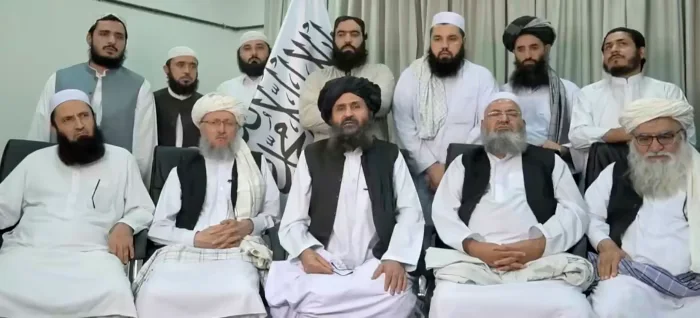It is nearly three weeks since the Taliban took over Kabul. Since then, there is a lot of discussion taking place at the global policy circles and humanitarian organizations; about their future plans/policies regarding women’s rights, media liberty and general way of governance.
A wave of fear prevails with the masses, especially among the Afghan women regarding the Taliban rule; keeping in view their last repressive tenure and the imposition of Sharia in which women had many restrictions regarding their way of life, education and job.
The manner in which the Taliban took over Kabul is something that shocked the world. Despite having an air force, modern weaponry and organizational structure the Afghan forces withered in days. President Joe Biden said that Afghan forces are well equipped. Mr Biden predicted that due to the presence of the Afghan air force, the Taliban takeover will not happen. However, the Taliban proved them wrong. The US never thought the Taliban would take over Kabul in such a structured and systematic way at once; that too without any bloodshed. Interestingly, the Taliban took over Kabul and the entire country, not through military power rather; it was all political, except for the fight with the resistance forces in Pasnjshir valley.
What To Expect From This Revised Version Of Taliban?
In what respect are the new Taliban or Taliban 2.0 are different from the previous ones? This is a question quite a few are looking into. More or less it’s going to define the future of Afghanistan. As resultantly, it will also affect a normal Afghan citizen’s life.
It appears that the present-day Taliban are; more international, socially open, composed, technologically advance and communicating with better modes and language. The Taliban are now well connected to the world and well acquainted with the technology. Consequently, they have used it to their advantage. This generation has an immense presence on social media. It has won the war narrative before winning the actual war on the ground. The younger generation of the Taliban are the ones born and brought up during the U.S. occupation. Their motives were clear from the first day; they want the occupation forces out of Afghanistan at any cost and they did achieve it at last.
Besides, the Taliban fought with the U.S. and NATO forces that has remarkably increased their skills as a fighting force. Unlike the previous ‘guerilla warriors’, the Taliban are now well structured, organized and better trained with modern weaponry.
Thanks to the U.S., the now Taliban have access to the world’s most modern weaponry and war machinery. These weapons were also used against the Northern Alliance before taking over Panjshir for the very first time.
Global Recognition Of The Taliban
At the moment, the Taliban need legitimacy and would not like to lose recognition. European Union, world powers including the G-7 countries—Canada, France, Germany, Italy, Japan, the United Kingdom, and the United States might agree to cooperate with the Taliban regime under harsh conditions, particularly safeguarding human rights and providing no sanctuaries to terrorists. Besides, China and Russia are in close contact as well. Ultimately, they might officially recognize the Taliban as soon as a proper government is announced. Though a day earlier, the Taliban announced a caretaker government and Mohammad Hasan Akhund has been appointed as the head of the interim setup.
Surprisingly, the Taliban have not passed this initial trial. This is because other factions have not been given much representation. Individuals on different lists have been appointed as cabinet members and there is no female inclusion in the interim setup. Whatever the reasons may be, the leadership should realize that it is not a 90’s Afghanistan.
The Taliban need to stop thinking like an insurgency and start acting like a political faction; if they want a less bumpy road ahead.
They should form a government that should be both socially and politically inclusive. That is if they want accreditation and long term cooperation from the West.
A Blueprint To Authenticate The Rule
If the Taliban would like to have an international acceptance, they do not have to repeat the policies of their last tenure. They must put human rights first. The Western powers and Europe will not come to Afghanistan, if the Taliban are not going to be inclusive socially, politically and religiously. The major and obvious concerns are press freedom, basic human rights with an emphasis on women rights, and no safe havens for terrorists. Furthermore, for massive reconstruction and rehabilitation work, Afghanistan needs the support of the international community, so mere assurances will not work now.
Way Forward For Taliban
First and foremost the Taliban need to form an all-inclusive government, on a perfect power-sharing formula, having representation from all stakeholders, ethnicities and women. Somehow, until now Taliban’s narrative lacks inclusion and pluralism, which makes them prone to lose their authenticity. An all-encompassing government by the Taliban is the need of the hour, keeping in view the various ethnicities and sects in Afghanistan. If the Government is not all-inclusive then there are chances of armed resistance. This will allow other powers to intermediate and it will blow a regional war. Afghanistan will become a battleground for regional powers and every state will be securing its\’ national interests. Therefore a power-sharing formula inclusive of all stakeholders is the first step towards securing a peaceful future, barring it from civil war and regional interferences.
Secondly, a zero-tolerance policy towards terrorist groups is another important aspect the Taliban should examine keeping into consideration the ground realities. The emergence of Islamic State Khorasan Province (ISKP) took place during the U.S. presence in Afghanistan and it keep spreading and making its roots stronger. As Zabihullah Mujahid, the Taliban’s spokesman reiterated that “We don’t want any internal or external enemies.”
So now, the Taliban need to have a zero-tolerance policy towards these splinter terrorist groups, because their support and growth means unimaginable chaos and instability, not just for Afghanistan but for the entire region. No country would like to see Afghan soil beings used to their disadvantage or for terrorist activities.
Reassurance From The Taliban Leadership
Taliban have restated and clarified that this time their term will be different from the previous one. In a press conference, Taliban’s spokesman Zabihullah Mujahid said “We are going to allow women to work and study. We have got frameworks, of course. Women will stay active in the society but within the framework of Islam.” He stated. “Similarly, the media will also operate within our cultural frameworks. Private media can continue to be free and independent. They can continue their activities”, he added. Here the terms used are vague; Taliban leadership should define them to eliminate any confusion about their motives or underline meanings. Despite repeated assurances of transformational reforms, the experts still fear that the Taliban rule could resemble the repressive era of the 1990s.
This time, they need to show moderation so that the middle-class Afghan who invested in making academia flourish should stay in Afghanistan and help in the rebuilding process. The women who want to work and study should find it safe to go out of their homes. Likewise, the media should continue their job without the fear of getting apprehended. The international community, INGOs and other organizations should feel confident in taking part in the reconstruction and rehabilitation process in Afghanistan. Taliban have restated and clarified that this time their tenure will be different from the previous one.
Conclusion
The time will tell if the early day promises of Taliban are just a tactic to gain approval from the international community and liquefy their financial assets or their intentions are pure this time, but one thing is for sure that Taliban have emerged stronger than before and are here to rule Afghanistan for now.





![Ukrainian and Russian flags with soldier silhouettes representing ongoing conflict. [Image via Atlantic Council].](https://southasiatimes.org/wp-content/uploads/2026/02/2022-02-09T000000Z_1319661209_MT1NURPHO000HXCNME_RTRMADP_3_UKRAINE-CONFLICT-STOCK-PICTURES-scaled-e1661353077377.jpg)

